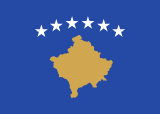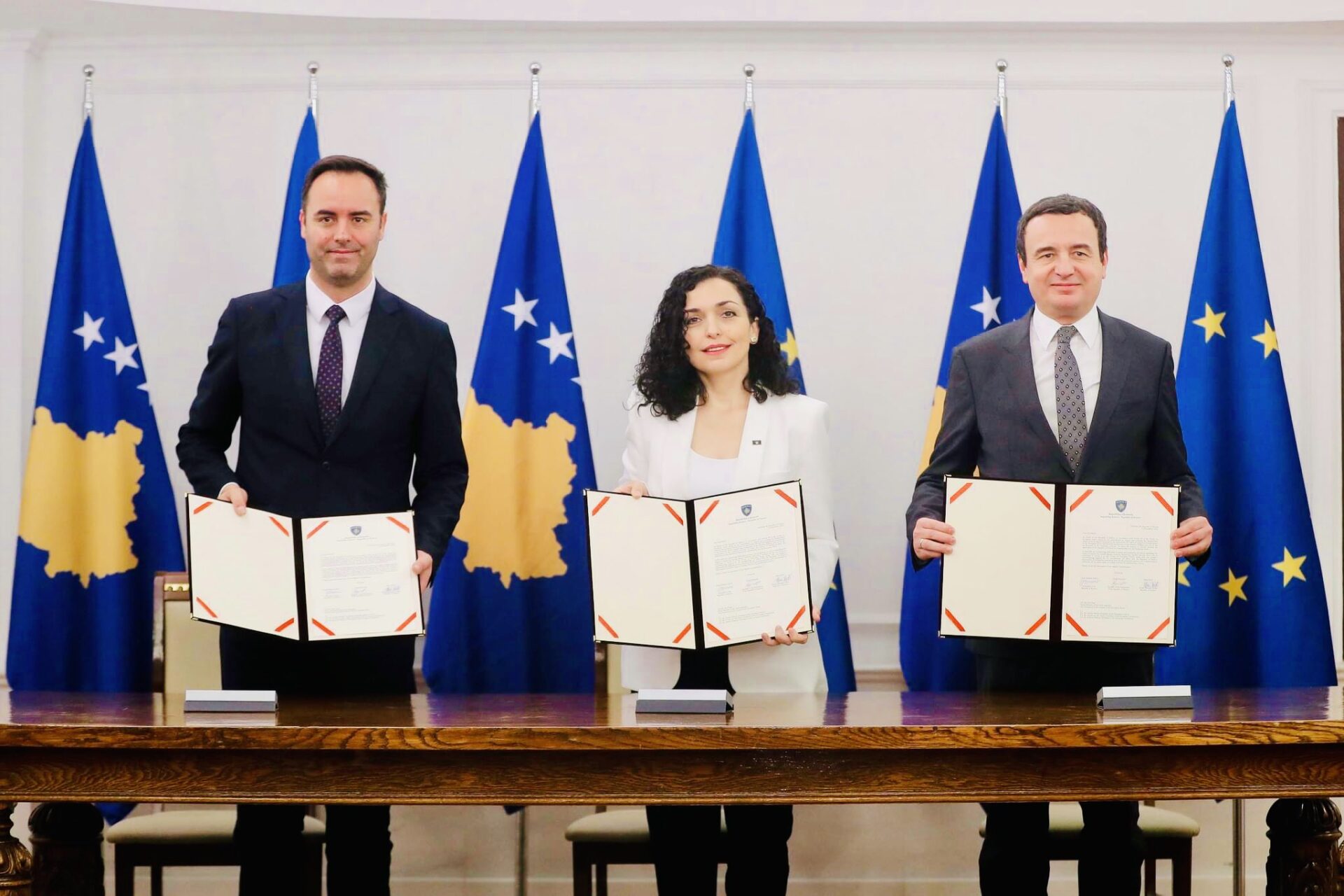
Kosovo
Kosovo performs in the mid-range across all four categories of the Global State of Democracy (GSoD) framework. Between 2019-2024, Kosovo did not experience any significant changes in the GSoD Indices. Kosovo has a service and consumption-based economy, and since declaring independence in 2008, it has seen steady economic progress.
Kosovo’s independence followed the 1998-1999 Kosovo conflict between ethnic Albanians and ethnic Serbs, marked by NATO’s armed intervention to stop Serbian forces’ atrocities and ethnic cleansing. Although the International Court of Justice (ICJ) ruled Kosovo’s independence legal and a majority of UN member states recognize Kosovo, many countries, including Serbia, do not. As a post-conflict society, the ethnic division between Kosovo Albanians (90.8 per cent) and Kosovo Serbs (around 3.3 per cent) represents[GG1] one of the most important political fault lines. The Belgrade-backed ‘parallel’/illegal structures in Serb municipalities in Kosovo have been recently dissolved and the influence of their associated groups or parties is waning, but issues such as war crimes, missing persons, and ongoing disputes often lead to ethnic tensions. The genuine integration of the Kosovo Serbs, most of whom do not recognize independence, boycott authorities and are influenced by Serbia, is a major challenge. Other minorities include Roma, Ashkali, Egyptians, Bosniaks, Turks, and Gorani. 20 out of 120 parliamentary seats are guaranteed for minorities (10 specifically allotted for ethnic Serbs). Discrimination and poverty of Roma, Ashkali, and Egyptians persist.
For decades, society was divided between supporters of peaceful and armed approaches in the conflict with Serbia, with political parties representing these camps dominating for over 20 years amid widespread corruption. In 2021, a new political elite rose to prominence on a platform to tackle corruption and state capture. Differing approaches to the EU-facilitated dialogue with Serbia, the rule of law in Serb-dominated municipalities, and membership in international organizations, have often caused disagreements between the government, opposition, and international community. Given the support for the EU is among the highest in the region, these issues impact public approval.
The profound political polarization and deadlock following the 2025 elections have raised concerns about potential setbacks and the implications for various sectors and institutions. Rising living costs and low wages have fueled fears of depopulation. Additionally, the independence of the public broadcaster, attempts to undermine the media, the rise of ‘digital vigilantism,’ and corporate capture of the media, have also triggered alarm.
Kosovo has a mid-range performance in Gender Equality. Women’s political representation has increased, with two female presidents since independence, and with women surpassing the parliamentary quota. Progress was also made in areas such as sports, combating social stigma and establishing a reparations system for an estimated 20,000 wartime rape survivors. Challenges persist in representation at the local level, domestic violence, economic disparities, and discrimination in property inheritance. The right to change name and sex marker in documents is recognized, and the government has been trying to legalize same-sex civil unions, though LGBTQIA+ people facing abuse lack access to safe housing.
Looking ahead, it is crucial to monitor Representation, in light of the long institutional stalemate in 2025. It will be important to watch Rule of Law with regard to the fight against corruption, as well as Personal Integrity and Security, especially in Serb-majority areas. Social Group Equality and Freedom of the Press should be observed to ensure minority and LGBTQIA+ rights and media independence are upheld. Basic Welfare and Economic Equality should be monitored, given the concerns about the cost of living and emigration.
Last updated: August 2025
https://www.idea.int/democracytracker/
December 2025
Prime Minister Albin Kurti’s Vetevendosje party wins snap parliamentary elections

Prime Minister Albin Kurti’s Vetevendosje (VV) won the snap parliamentary elections held on 28 December, with 51.1 per cent of the vote and 57 of 120 seats, the strongest result by any party since the country’s independence. The Democratic Party of Kosovo (PDK) secured 20.2 per cent (22 seats) and the Democratic League of Kosovo (LDK) 13.2 per cent (15 seats). The Serbian List kept its nine reserved seats and the Freedom, Justice and Survival Party retained the remaining one reserved for the Serbian minority. The elections followed a year‑long political deadlock after more than 50 failed attempts to form a government. Turnout reached 47.5 per cent, slightly higher than 46.5 per cent in February 2025. Women secured 37 seats, down from 44 in the previous elections, yet still above the 30 per cent quota. A Council of Europe Parliamentary Assembly delegation assessed the elections as smoothly run, professionally organized, and inclusive despite tight deadlines.
Update: On 13 January, the Kosovo Central Election Commission ordered a recount in 10 municipalities after detecting possible errors in candidate‑vote registration and inconsistencies in the handling of invalid ballots. The recount uncovered manipulation, pointing to intra-party vote stealing, most prominently in the opposition PDK, where some candidates lost thousands of votes. On 19 January, the CEC therefore ordered a full recount. While the election results at the party level remained unchanged, one MP from the Turkish Democratic Party of Kosovo lost his seat, being replaced by another party colleague. The CEC will submit the recount findings to the special prosecution for investigation.
Sources: Kosovo Central Election Commission (1), Kosovo Central Election Commission (2), International IDEA (1), The Guardian, Parliamentary Assembly of the Council of Europe, Balkan Insight, Kallxo, International IDEA (2), International IDEA (3), Gazeta Express, Koha
August 2025
Assembly and institutions paralyzed due to political deadlock
The failure to formally inaugurate Parliament has left the institution’s work paralyzed since the February elections, triggering an institutional crisis and leaving the government in a caretaker role without a full constitutional mandate. In August, after 57 parliamentary sessions and two Constitutional Court rulings, the Assembly Speaker was finally elected. However, the deadlock continued, as the constitutionally guaranteed position of the Serb Deputy Speaker failed to secure votes in the three rounds. A fourth attempt to renominate the same candidate was blocked by the Assembly Speaker, citing the Court’s ruling prohibiting more than three nominations of the same candidate. The resulting institutional vacuum has stalled legislative functioning, delayed reforms and disrupted some basic public services. For example, the budget transfer to the public broadcaster RTK was blocked, leaving 700 employees unpaid, prompting protests and forcing RTK to secure EUR 2.54 million loan from the Ministry of Finance.
Sources: ConstitutionNet, Balkan Insight (1), Balkan Insight (2), Constitutional Court of the Republic of Kosovo, European Western Balkans, International Federation of Journalists
Update: On 19 November, Kosovo’s parliament failed to elect a new government, prompting President Vjosa Osmani to dissolve the Assembly and call early elections for 28 December. The move follows months of political deadlock since the February elections, which left the country under an interim government.
February 2025
Prime Minister Albin Kurti's incumbent party wins parliamentary elections

In the parliamentary elections of 9 February, incumbent Prime Minister Albin Kurti and his Vetevendosje party (VV) came first with 42.3 per cent of the vote, winning 48 out of Parliament’s 120 seats. The Democratic Party of Kosovo (PDK) received 20.9 per cent (24 seats) and the Democratic League of Kosovo (LDK) 18.3 per cent (20 seats). For the first time, the Serbian List lost one of the 10 parliamentary seats reserved for the Serbian minority. The seat was won by the For Freedom, Justice, and Survival party, which is known for its more cooperative stance toward Kosovo’s institutions. Women secured 44 seats, exceeding the 30 per cent quota, the same as in 2021. In a preliminary statement, the EU Election Observation Mission stated that the election process was peaceful and vibrant despite deep divisions in the country, which were reflected in verbal attacks by some of the candidates. Voter turnout was 46.5 per cent, down from 48.8 per cent in 2021.
Update: The European Union election observers noted that the elections were peaceful, competitive, and generally well-conducted, but marred by poor organization, harsh rhetoric, and undue pressure on voters in Serb-majority areas by Serbia and the Srpska Lista party.
Sources: Komisioni Qendror i Zgjedhjeve, European Union External Action (1), European Union External Action (2), Politico, International IDEA, European Union Election Observation Mission
September 2023
Police officer killed as Serb gunmen storm Kosovo

Serb gunmen dressed in military uniforms stormed Banjska, a Serb-dominated village, and barricaded in its monastery after having battled the Kosovo Police and killed one of its officers. Authorities reported that a minimum of five out of at least 30 attackers were killed. The European Commission labelled this a terrorist attack. No civilians were injured. The police discovered a significant cache of heavy weaponry, ammunition, and equipment. ID documents of Serbs were found, including the gun permit of Milan Radoičić, Vice President of Lista Srpska, a Kosovo Serb party supported by Serbia’s President Aleksandar Vučić. Radoičić confirmed his participation in the attack. Kosovo's leaders attributed the attack to Serbia, while Serbia’s President denied any involvement, asserting it emanated from local Kosovo Serbs who no longer wished to endure what he referred to as "Kurti's terror." After the attack, the US reported a significant Serbian military presence along the Kosovo border, and the Serbian President announced orders for their withdrawal. This unprecedented attack follows months of increased tensions between Kosovo and Serbia.
Sources: Radio Free Europe/Radio Liberty, Prishtina Insight, Reuters, Euractiv, EU External Action, Politico (1), Politico (2), The Guardian
See all event reports for this country
Global ranking per category of democratic performance in 2024
Basic Information
Performance by category over the last 6 months
Blogs
Global State of Democracy Indices
Hover over the trend lines to see the exact data points across the years
Factors of Democratic Performance Over Time
Use the slider below to see how democratic performance has changed over time
